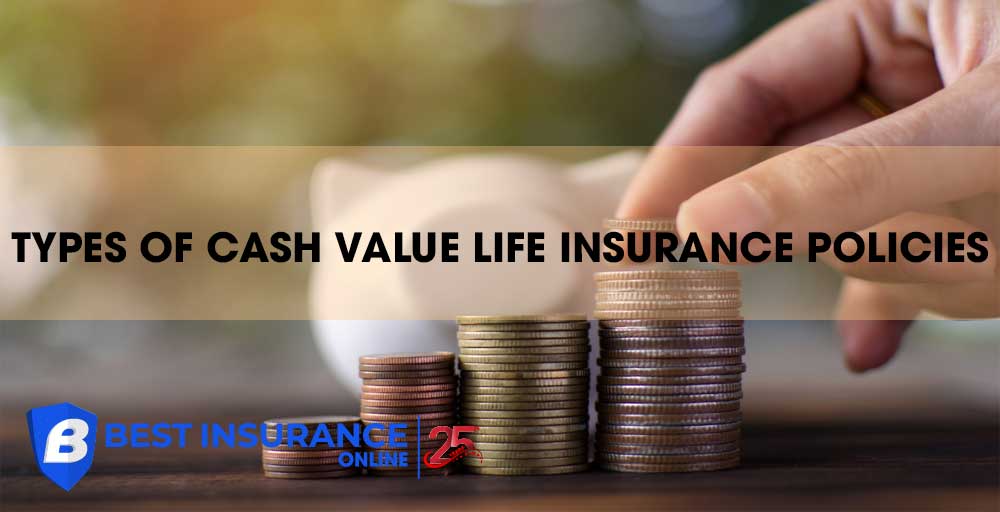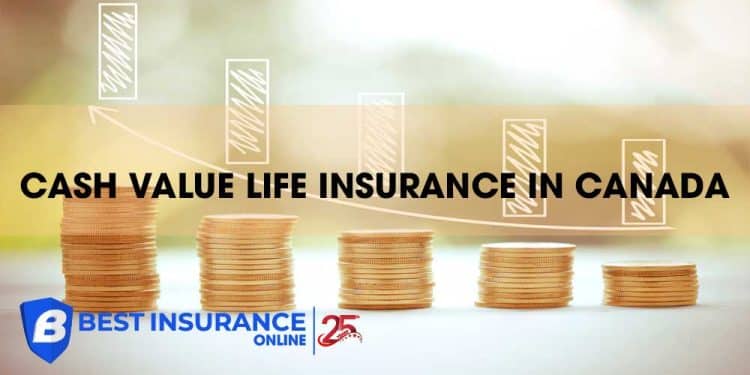Cash Value Life Insurance is a unique financial product that combines lifetime life insurance coverage with savings or investments. The following guide of BestIO will explore what cash value life insurance is, how it works, the different types of policies available, and its benefits and drawbacks. By the end, you’ll clearly understand whether It is the right choice for your financial needs.
What is Cash Value Life Insurance?
Cash value life insurance is a form of permanent life insurance that provides lifetime coverage while accumulating a savings element known as the cash value. This cash value grows over time on a tax-deferred basis, allowing you to build wealth alongside your life insurance coverage. This dual functionality makes it an attractive option for individuals seeking financial security for their loved ones and a means to grow their wealth over time.
How Does Cash Value Life Insurance Work in Canada?
When you pay premiums for a cash value life insurance policy, your payments are allocated to three main areas:
- Funding the policy’s death benefit: A portion of each premium payment provides guaranteed life insurance coverage.
- Paying policy fees: Some of the premium covers administrative costs and mortality risk charges associated with the policy.
- Contributing to the policy’s cash value account: The remainder of the premium is allocated to a cash value account, which grows tax-deferred over time.
In the policy’s early years, a more significant portion of the premiums goes towards insurance costs and fees, initially resulting in slower cash value growth. However, as the policy matures and the policyholder ages, the insurance cost decreases, allowing more of each premium payment to be allocated to the cash value account. This results in accelerated cash value growth in the policy’s later years.
The cash value component earns interest at either a fixed or variable rate, depending on the specific type of policy. This interest is not taxed as it accumulates, providing policyholders a tax-advantaged way to build wealth over time.
Factors Affecting Cash Value Growth
The growth of your policy’s cash value depends on several factors, including the type of policy you have, the insurer’s financial performance, and the underlying investments’ performance (in the case of variable or indexed policies). Some policies offer guaranteed minimum interest rates, while others provide the potential for higher returns tied to market performance.
Who Should Consider Cash Value Life Insurance?
Cash Value Life Insurance can be an attractive option for individuals who:
- Seek lifelong life insurance coverage with a savings component
- Have maxed out other tax-advantaged savings vehicles and are looking for additional growth opportunities
- Want a flexible financial tool that can adapt to changing life circumstances
- Are comfortable with the higher premiums and potential for lower returns compared to other investment options
On the other hand, if your primary focus is on obtaining affordable life insurance coverage or maximizing investment returns, other options, such as term life insurance or traditional investment vehicles, may be more suitable.
What are Different Types of Cash Value Life Insurance Policies?

There are 5 types of Cash Value Life Insurance policies, each with unique features, benefits, and risks. Understanding the differences between these policies can help you choose the one that best aligns with your financial goals and risk tolerance.
Cash Value Whole Life Insurance
Whole Life Insurance is the most traditional type of Cash Value Life Insurance. These policies feature fixed premiums, guaranteed death benefits, and predictable cash value growth. The cash value in a Whole Life policy increases at a rate determined by the insurer, making it stable and not influenced by market changes or health conditions. This makes whole life insurance a relatively low-risk option.
Cash Value Universal Life Insurance
Universal Life Insurance offers more flexibility compared to Whole Life policies. Policyholders can adjust their premiums and death benefits within certain limits, and the cash value growth is based on the insurer’s declared interest rate or the performance of market-linked investments. This adjustability allows policyholders to adapt their coverage and savings strategies as their financial needs change. This policy type has the potential for higher cash value growth but also comes with more risks.
Cash Value Variable Universal Life Insurance
Variable Universal Life Insurance allows policyholders to invest their cash value in various sub-accounts, similar to mutual funds. This policy offers the flexibility in premium payments and death benefit and the potential for higher returns. However, it also comes with greater risk, as the cash value and death benefit can fluctuate based on the performance of the underlying investments. Variable policies are best suited for individuals comfortable with market risk and willing to manage their investments actively.
Cash Value Indexed Universal Life Insurance
Indexed Universal Life Insurance combines the flexibility of Universal Life with the growth potential linked to a stock market index, such as the S&P 500. These policies offer cash value growth based on market performance while protecting against market losses. Indexed policies can be a good middle ground for those seeking higher returns than traditional Whole Life but with less risk than Variable policies.
Cash Value Guaranteed Issue Life Insurance
Guaranteed Issue Life Insurance is a type of Whole Life policy that does not require a medical exam or health questions for approval. While the coverage amounts are typically modest, these policies can still include a cash value component that grows over time. Guaranteed Issue policies are an option for individuals who may not qualify for traditional life insurance due to health concerns.
How to Access the Cash Value of Your Life Insurance Policy?
One of the most significant advantages of Cash Value Life Insurance is the ability to access and use the accumulated cash value during the policyholder’s lifetime. There are several ways to leverage this valuable asset:
Policy Loans
Policyholders can borrow against their life insurance policy’s cash value at relatively low interest rates without undergoing credit checks or income verification. The loan does not need to be paid back, but unpaid loans will reduce the death benefit. It can be used for various purposes, such as funding education, starting a business, or covering unexpected expenses. However, any unpaid loan balances will accrue interest and reduce the policy’s death benefit if not repaid.
Withdrawals
Policyholders can also withdraw a portion of their cash value, although this may have tax implications and will reduce the policy’s death benefit. Withdrawals up to the total premiums paid into the policy are generally tax-free, while any withdrawals exceeding this amount may be subject to income taxes. Excessive withdrawals may cause the policy to lapse.
Paying Premiums with Cash Value
Some policies allow policyholders to use their accumulated cash value to cover future premium payments. This strategy can be beneficial during retirement, when income may be reduced, as it allows policyholders to maintain their life insurance coverage without ongoing out-of-pocket expenses.
Surrendering the Policy
If a policyholder no longer needs life insurance coverage or wants to access the full cash value, they can choose to surrender the policy. Upon surrender, the policyholder will receive the net cash value (minus any surrender charges or outstanding loans). If the cash value received exceeds the total premiums paid, this may result in taxable income. Surrendering a policy also means forfeiting the death benefit, so this decision should be carefully considered.
What are the Advantages of Cash Value Life Insurance?
Cash Value Life Insurance offers 4 compelling benefits
Lifelong Coverage and Savings
Cash Value Life Insurance provides the peace of mind of knowing your loved ones will be financially protected, no matter when you pass away. At the same time, it offers a tax-advantaged savings vehicle that can help you build wealth over your lifetime.
Tax-Deferred Growth Potential
The cash value in your policy grows tax-deferred, meaning you won’t pay taxes on the accumulated earnings unless you withdraw more than the total premiums paid. This tax advantage can significantly enhance your long-term wealth accumulation, especially for those in higher tax brackets.
Financial Flexibility
With the ability to access your cash value through loans, withdrawals, or premium payments, Cash Value Life Insurance offers financial flexibility not found in many other investment vehicles. This flexibility can be invaluable when facing unexpected expenses, funding major life events, or supplementing retirement income.
No Contribution Limits
Unlike many tax-advantaged savings plans, such as 401(k)s or IRAs, Cash Value Life Insurance policies do not have annual contribution limits. This feature makes them attractive for high-net-worth individuals who have already maxed out other tax-advantaged savings vehicles and are looking for additional ways to grow their wealth.
Potential Drawbacks of Cash Value Life Insurance
There are also 4 potential drawbacks of Cash Value Life Insurance to consider
Higher Premiums
Due to the cash value component and lifelong coverage, Cash Value Life Insurance policies typically have higher premiums than term life insurance. This higher cost may make them less accessible for individuals with limited budgets or those primarily focused on obtaining affordable life insurance protection.
Slow Early Growth
In the early years of a Cash Value Life Insurance policy, a more significant portion of the premiums goes towards insurance costs and fees, resulting in slower cash value accumulation during this period. It may take several years before the cash value grows significantly, which could concern those looking for more immediate investment growth.
Potential for Lower Returns
While Cash Value Life Insurance policies offer the potential for tax-deferred growth, their returns may be lower than other investment options, such as mutual funds or stocks. This lower return potential could limit overall wealth accumulation, particularly for those with a higher risk tolerance and a longer investment horizon.
Complexity and Fees
Cash Value Life Insurance policies can be complex, with various fees, charges, and investment options to consider. This complexity can make it challenging for policyholders to fully understand their policy’s features and make informed decisions about their coverage and investments. Additionally, some policies may have high fees or surrender charges, which can impact the overall returns and liquidity of the cash value.
Is Cash Value Life Insurance Right for You?
Cash value life insurance can be a valuable tool for individuals seeking lifelong coverage, a forced savings component, and financial flexibility. However, it is essential to carefully consider your unique needs, goals, and budget when determining if this type of policy is right for you.
5 Steps to take before purchasing a cash value life insurance policy
Step 1: Assess your long-term financial goals and insurance needs
Step 2: Compare different policy options and life insurance companies in Canada
Step 3: Consult with a financial advisor or insurance professional to discuss your specific situation
Step 4: Understand the policy’s features, benefits, and limitations
Step 5: Review and adjust your coverage as your needs change over time
By thoroughly understanding the features, benefits, and drawbacks of cash value life insurance, you can decide whether this policy aligns with your financial objectives and risk tolerance.
Frequently Asked Questions About Cash Value Life Insurance in Canada
Do all life insurance policies have a cash value component?
No, not all life insurance policies have a cash value component. Term life insurance, for example, does not include cash value accumulation and only provides coverage for a specified term.
What happens to the cash value if I surrender my policy?
If you surrender your Cash Value Life Insurance policy, you will receive the net cash value (minus any surrender charges or outstanding loans). However, surrendering the policy also means forfeiting the death benefit and terminating your life insurance coverage.
Can I take a loan from my Cash Value Life Insurance policy?
Yes, most Cash Value Life Insurance policies allow policyholders to borrow against the accumulated cash value at relatively low interest rates without credit checks or income verification. However, any unpaid loan balances will accrue interest and reduce the policy's death benefit if not repaid.
Is the cash value growth in a life insurance policy taxable?
The cash value in a life insurance policy grows tax-deferred, meaning you won't pay taxes on the accumulated earnings unless you withdraw more than the total premiums paid into the policy. Any withdrawals exceeding the total premium payments may be subject to income taxes.
How does the cash value affect my policy's death benefit?
The cash value is separate from the policy's death benefit. The beneficiaries receive the death benefit when the policyholder dies, while the accumulated cash value reverts to the insurance company. However, any outstanding loans or withdrawals from the cash value will reduce the death benefit paid to the beneficiaries.
Do all life insurance policies have a cash value component?
No, not all life insurance policies have a cash value component. Term life insurance, for example, does not include a cash value account and only provides coverage for a specified term.
Can you lose your cash value if the policy lapses?
If a policy lapses due to non-payment of premiums, the policyholder may forfeit the accumulated cash value.













